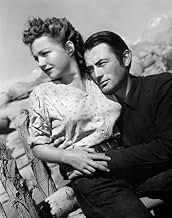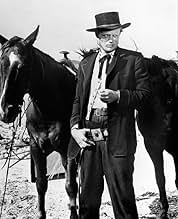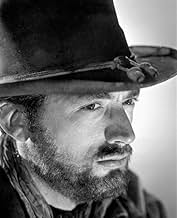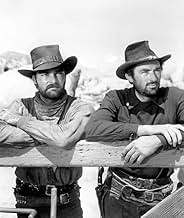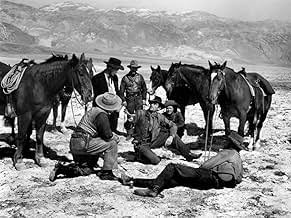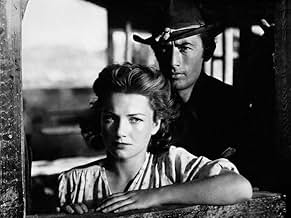VALUTAZIONE IMDb
7,4/10
6228
LA TUA VALUTAZIONE
Aggiungi una trama nella tua linguaA pistol-packing tomboy and her grandfather discover a band of bank robbing bandits taking refuge in the neighboring ghost town.A pistol-packing tomboy and her grandfather discover a band of bank robbing bandits taking refuge in the neighboring ghost town.A pistol-packing tomboy and her grandfather discover a band of bank robbing bandits taking refuge in the neighboring ghost town.
- Regia
- Sceneggiatura
- Star
- Premi
- 5 vittorie totali
Harry Morgan
- Half Pint
- (as Henry Morgan)
Carlos Acosta
- Indian
- (non citato nei titoli originali)
Robert Adler
- Jed
- (non citato nei titoli originali)
Ray Beltram
- Indian
- (non citato nei titoli originali)
Harry Carter
- Cavalry Lieutenant
- (non citato nei titoli originali)
William Gould
- Banker
- (non citato nei titoli originali)
Eula Guy
- Woman Bank Customer
- (non citato nei titoli originali)
Paul Hurst
- Drunk
- (non citato nei titoli originali)
Victor Kilian
- Bartender
- (non citato nei titoli originali)
Norman Leavitt
- Bank Teller
- (non citato nei titoli originali)
Jay Silverheels
- Indian
- (non citato nei titoli originali)
Recensioni in evidenza
Yellow Sky is an excellent western, especially to a western buff like me. Along with a top-notch cast, fabulous lighting and great cinematography, I truly enjoyed picking out the locations, most of which were from the Inyo County area of California. Due to my passion for mining in my free time, I was able to spot the Alabama Hills (where the set of the town was located) and the Dunes north of Panamint Springs as two of the locales from the film. Action sequences were well done. The plot, though predictable, has interesting twists, especially those involving Peck and Sheridan. Peck's character is also interesting in that it follows more along the lines of John Wayne's character in the Searchers, someone hardened to life who finally comes around to his humanity. I first encountered this film about a week ago on AMC. I do not know if it is availible on VHS or DVD. If someone could let me know if it is availible in these formats, I would appreciate it. All in all, a great film!
Stretch is the leader of bank robbing desperadoes, after their latest job they find the US Cavalry hot on their tail. Their only conceivable route of escape is to traipse over an enormous salt flat, low on water and bitten by the scorching sun, they happen to come across a ghost town named Yellow Sky. Here was once a prosperous town, now the only inhabitants are a crusty old prospector and his tomboy granddaughter. Soon the talk turns to hidden gold and it's not long before these desperate men will become conflicted in more ways than one. Be it greed, lust or the Apache, the day of reckoning is coming to Yellow Sky.
Yellow Sky is a technically stunning picture, directed with panache by William A. Welman, boasting starkly affecting black and white photography from Joseph MacDonald, and utilising the wonderful use of natural sounds. This picture is to me one of the shining lights of 1940s Westerns. Once the pulse racing pursuit of the robbers by the US Cavalry has finished, the film shifts into a master class of visual and dialogue driven delights. As the gang trundle across the desolate salt flat, the need for quenching the thirst hits the audience as much as it does the gang; I myself found that I was swigging rapidly from my cold can of beer! The Alabama Hills location is a sprawling, beautiful, never ending ode to the West, and then the actors kick in and do their stuff, and then some.
Gregory Peck plays the leader Stretch, an actor normally associated with a straight laced gait, here he is is weather worn and tired, his portrayal of Stretch as convincing as a role I have seen him tackle. Richard Widmark, in what I believe to be his first Western entry, is truly magnetic, a smirking, snarling Dude that you just know you couldn't trust if your life depended on it. Anne Baxter plays the sole female character of the piece (Mike), and she is pivotal to the whole film's strength, tough and full of spunk, her grasping of the situation in amongst these ragged men gives the piece it's time bomb ethic, and boy does Baxter do well with it.
All told there's no weakness' in the casting, they all do good work, and although the plot structure of the film is nothing out of the ordinary, the technical aspects coupled with the excellent writing on the page (W.R. Burnett story, Lamar Trotti screenplay) lift it way above many of its contemporaries. The ending has caused some consternation amongst Western critics over the years, and if I'm honest then it's not totally satisfactory to me personally, but it is in no way what so ever a bad ending, you just feel that the mood that had preceded it deserved something better. But as ever, it's up to the individual viewer to decide for themselves. 9/10
Yellow Sky is a technically stunning picture, directed with panache by William A. Welman, boasting starkly affecting black and white photography from Joseph MacDonald, and utilising the wonderful use of natural sounds. This picture is to me one of the shining lights of 1940s Westerns. Once the pulse racing pursuit of the robbers by the US Cavalry has finished, the film shifts into a master class of visual and dialogue driven delights. As the gang trundle across the desolate salt flat, the need for quenching the thirst hits the audience as much as it does the gang; I myself found that I was swigging rapidly from my cold can of beer! The Alabama Hills location is a sprawling, beautiful, never ending ode to the West, and then the actors kick in and do their stuff, and then some.
Gregory Peck plays the leader Stretch, an actor normally associated with a straight laced gait, here he is is weather worn and tired, his portrayal of Stretch as convincing as a role I have seen him tackle. Richard Widmark, in what I believe to be his first Western entry, is truly magnetic, a smirking, snarling Dude that you just know you couldn't trust if your life depended on it. Anne Baxter plays the sole female character of the piece (Mike), and she is pivotal to the whole film's strength, tough and full of spunk, her grasping of the situation in amongst these ragged men gives the piece it's time bomb ethic, and boy does Baxter do well with it.
All told there's no weakness' in the casting, they all do good work, and although the plot structure of the film is nothing out of the ordinary, the technical aspects coupled with the excellent writing on the page (W.R. Burnett story, Lamar Trotti screenplay) lift it way above many of its contemporaries. The ending has caused some consternation amongst Western critics over the years, and if I'm honest then it's not totally satisfactory to me personally, but it is in no way what so ever a bad ending, you just feel that the mood that had preceded it deserved something better. But as ever, it's up to the individual viewer to decide for themselves. 9/10
This fine, moody Western was one of a handful of efforts – heralded, incidentally, by the same director’s THE OX-BOW INCIDENT (1943) – which elevated the form and led the genre into its most popular (and prolific) era.
Superbly shot in crisp black-and-white by Joe MacDonald, the film makes the most of its stark location (Death Valley) and terse plot – following a robbery, a band of outlaws eludes the pursuing posse by crossing the desert and finally hitting the titular ghost town (where the only inhabitants are a grizzled prospector and his tomboyish, gun-toting half-breed niece). The cast is headed by relatively new stars of the era – Gregory Peck (in only his second Western), Anne Baxter (she had just won a Supporting Oscar for THE RAZOR’S EDGE [1946]) and Richard Widmark (this was his first of many genre outings, having only debuted a year previously) – which allowed an agreeably fresh and remarkably mature outlook on familiar themes (a small group of people fighting the elements, and themselves over lust and greed).
Though Widmark is surprisingly off-screen for long periods of time (and, consequently, tends to be overshadowed by his co-stars), this still emerges as perhaps the most satisfying among the Westerns he appeared in. For the record, he would play variations on his role here in both GARDEN OF EVIL (1954) and THE LAW AND JAKE WADE (1958); incidentally, I have two more Westerns of his lined up for this week – the former among them (see below) – as part of my tribute to the recently deceased actor. With YELLOW SKY, Peck followed his roguish turn in DUEL IN THE SUN (1946): the character is eventually revealed to be an upstanding person – an intrinsic part of the star’s on-screen persona, which he could play against effectively but did so only occasionally – forced into a life of crime by circumstances. Naturally, the gang subsequently turns on Peck for not wanting to keep all the gold to themselves – and he holes himself up in Baxter and her grandfather’s house, under siege from his former companions! Baxter, then, has been raised in a tough environment where she can practically overcome any obstacle despite her young age and sex: in fact, even more than the outlaws’ intrusion on the life she knew and the property that was rightfully hers, Baxter fears her personal reaction to them (finding herself especially drawn to Peck, who arouses her dormant feminine instincts!).
The film was adapted by Lamar Trotti (who also produced) from a novel by W.R. Burnett, an author more usually associated with gangster/noir pictures and, in fact, as can also be seen from the colorful character names here – Stretch (Peck), Dude (Widmark), Lengthy (dastardly John Russell), Half-Pint (diminutive Henry Morgan), the youthful Bull-Run, the cheerfully heavy-set Walrus, etc. – the narrative could very easily be tailored to that particular milieu. That said, when it was actually remade – in 1967 under the title THE JACKALS, and atypically featuring horror icon Vincent Price in the role of the prospector (by the way, I’ll be watching this version presently since I came across it as a rental) – it retained the Western ambiance, albeit with a difference (which I’ll discuss in that film’s own review).
At the end of the day, I’d say that YELLOW SKY is pretty much essential fare (beautifully handled by the practiced and versatile Wellman – highlighted by a three-way shoot-out which audaciously takes place in a darkened bar-room, and off-screen to boot!). Even so, the film seems to me to be relatively undervalued within the pantheon of the genre itself: for instance, it doesn’t rate as highly as Peck’s three most prestigious Western titles (the afore-mentioned “super production” DUEL IN THE SUN – elaborate, garish but overpowering, the no less grandiose and star-studded THE BIG COUNTRY [1958], and the intimate but psychologically-dense THE GUNFIGHTER [1950] – of which a second viewing is truly in order!).
Superbly shot in crisp black-and-white by Joe MacDonald, the film makes the most of its stark location (Death Valley) and terse plot – following a robbery, a band of outlaws eludes the pursuing posse by crossing the desert and finally hitting the titular ghost town (where the only inhabitants are a grizzled prospector and his tomboyish, gun-toting half-breed niece). The cast is headed by relatively new stars of the era – Gregory Peck (in only his second Western), Anne Baxter (she had just won a Supporting Oscar for THE RAZOR’S EDGE [1946]) and Richard Widmark (this was his first of many genre outings, having only debuted a year previously) – which allowed an agreeably fresh and remarkably mature outlook on familiar themes (a small group of people fighting the elements, and themselves over lust and greed).
Though Widmark is surprisingly off-screen for long periods of time (and, consequently, tends to be overshadowed by his co-stars), this still emerges as perhaps the most satisfying among the Westerns he appeared in. For the record, he would play variations on his role here in both GARDEN OF EVIL (1954) and THE LAW AND JAKE WADE (1958); incidentally, I have two more Westerns of his lined up for this week – the former among them (see below) – as part of my tribute to the recently deceased actor. With YELLOW SKY, Peck followed his roguish turn in DUEL IN THE SUN (1946): the character is eventually revealed to be an upstanding person – an intrinsic part of the star’s on-screen persona, which he could play against effectively but did so only occasionally – forced into a life of crime by circumstances. Naturally, the gang subsequently turns on Peck for not wanting to keep all the gold to themselves – and he holes himself up in Baxter and her grandfather’s house, under siege from his former companions! Baxter, then, has been raised in a tough environment where she can practically overcome any obstacle despite her young age and sex: in fact, even more than the outlaws’ intrusion on the life she knew and the property that was rightfully hers, Baxter fears her personal reaction to them (finding herself especially drawn to Peck, who arouses her dormant feminine instincts!).
The film was adapted by Lamar Trotti (who also produced) from a novel by W.R. Burnett, an author more usually associated with gangster/noir pictures and, in fact, as can also be seen from the colorful character names here – Stretch (Peck), Dude (Widmark), Lengthy (dastardly John Russell), Half-Pint (diminutive Henry Morgan), the youthful Bull-Run, the cheerfully heavy-set Walrus, etc. – the narrative could very easily be tailored to that particular milieu. That said, when it was actually remade – in 1967 under the title THE JACKALS, and atypically featuring horror icon Vincent Price in the role of the prospector (by the way, I’ll be watching this version presently since I came across it as a rental) – it retained the Western ambiance, albeit with a difference (which I’ll discuss in that film’s own review).
At the end of the day, I’d say that YELLOW SKY is pretty much essential fare (beautifully handled by the practiced and versatile Wellman – highlighted by a three-way shoot-out which audaciously takes place in a darkened bar-room, and off-screen to boot!). Even so, the film seems to me to be relatively undervalued within the pantheon of the genre itself: for instance, it doesn’t rate as highly as Peck’s three most prestigious Western titles (the afore-mentioned “super production” DUEL IN THE SUN – elaborate, garish but overpowering, the no less grandiose and star-studded THE BIG COUNTRY [1958], and the intimate but psychologically-dense THE GUNFIGHTER [1950] – of which a second viewing is truly in order!).
This is not just your ordinary western. Top stars, great scenery and a well acted, but ordinary story. Gregory Peck leads a gang of bank robbers into the desert with the law hot on the trail. Peck ends up romancing Anne Baxter; and dealing with an Arizona ghost town while trying to calm down his angry pack of thieves. Also in the cast are: Richard Widmark, John Russell, Harry Morgan and Jay Silverheels. Beautiful black & white western action.
Yellow Sky (1948)
A classic and somewhat formulaic, beautifully photographed Western with a couple small twists. The main thing you might not catch is that this is an adaptation of "The Tempest," by Shakespeare. Here, the band of travelers crosses a metaphoric sea (the desert) and reaches a "New World" where they sort out what matters between them. The set was built (and deliberately destroyed) from an old silent film set that was left over.
Of note--Gregory Peck and Richard Widmark together for their only time, and they inevitably end up as enemies. The setting is the amazing and deadly Death Valley, and the locations shooting is shot there for authenticity. William Wellman was one of those consistently excellent directors who never really made a bad film, but didn't always make exceptional ones, and this one is right in his usual mix of strong visuals, tight editing, fairly simple dramatic plots, and a key actor or two to identify with.
Ann Baxter is the third leading character, and she's pretty much right on, with some grit and determination, but also a little too isolated for her own good. She's a kind of parallel to the really touch Mercedes McCambridge in "Johnny Guitar," a far more inventive movie, but one where an isolated woman (or two) have to fight off the greedy male rabble. Sort of like life, sometimes. Note that "Johnny Guitar" is four years later.
Besides Wellman's expertise, cinematographer Joe MacDonald's work is really worth noticing, for once again he helps elevate a fairly straightforward plot into something hard bitten, layered, and beautiful. MacDonald, born in Mexico, really came into his own by the late forties, and is behind a whole bunch of noir and western classics (as well as the famous "How to Marry a Millionaire"). In all, it's a really good movie, no question.
A classic and somewhat formulaic, beautifully photographed Western with a couple small twists. The main thing you might not catch is that this is an adaptation of "The Tempest," by Shakespeare. Here, the band of travelers crosses a metaphoric sea (the desert) and reaches a "New World" where they sort out what matters between them. The set was built (and deliberately destroyed) from an old silent film set that was left over.
Of note--Gregory Peck and Richard Widmark together for their only time, and they inevitably end up as enemies. The setting is the amazing and deadly Death Valley, and the locations shooting is shot there for authenticity. William Wellman was one of those consistently excellent directors who never really made a bad film, but didn't always make exceptional ones, and this one is right in his usual mix of strong visuals, tight editing, fairly simple dramatic plots, and a key actor or two to identify with.
Ann Baxter is the third leading character, and she's pretty much right on, with some grit and determination, but also a little too isolated for her own good. She's a kind of parallel to the really touch Mercedes McCambridge in "Johnny Guitar," a far more inventive movie, but one where an isolated woman (or two) have to fight off the greedy male rabble. Sort of like life, sometimes. Note that "Johnny Guitar" is four years later.
Besides Wellman's expertise, cinematographer Joe MacDonald's work is really worth noticing, for once again he helps elevate a fairly straightforward plot into something hard bitten, layered, and beautiful. MacDonald, born in Mexico, really came into his own by the late forties, and is behind a whole bunch of noir and western classics (as well as the famous "How to Marry a Millionaire"). In all, it's a really good movie, no question.
Lo sapevi?
- QuizDuring filming, Gregory Peck broke his ankle in three places after falling from his horse.
- BlooperJust before beginning to cross the salt flats after the bank robbery, Dude pulls his saddle stirrup out to jump into it, but misses. The scene cuts immediately to another view, showing him successfully mounting the horse.
- Citazioni
James 'Stretch' Dawson: I ain't talkin to hear my voice. I'm ordering ya.
- Curiosità sui creditiOpening credits prologue: The West - 1867
- ConnessioniFeatured in Alba fatale (1943)
I più visti
Accedi per valutare e creare un elenco di titoli salvati per ottenere consigli personalizzati
- How long is Yellow Sky?Powered by Alexa
Dettagli
Botteghino
- Lordo Stati Uniti e Canada
- 5.600.000 USD
- Tempo di esecuzione1 ora 38 minuti
- Colore
- Proporzioni
- 1.37 : 1
Contribuisci a questa pagina
Suggerisci una modifica o aggiungi i contenuti mancanti



